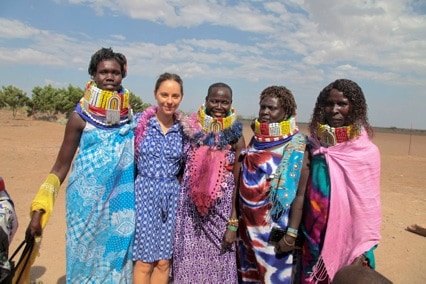In December 2013 I began my journey to the land of genesis. In North Kenya, bordering with Ethiopia, Uganda and South Sudan lays the Turkana Desert. Not much has changed here since the days of Abraham. Most of the people of Turkana are pastoralist shepherds who live in straw huts, trade in goats and beads and live off a diet of mostly meat, milk and blood.
The people of Turkana are not immune of global environmental and social changes, Droughts, hunger, lack of medicine and education are only part of the problems they face. The common solution among humanitarian organizations in places such as Turkana is distribution of food and money. Such solutions create problems. I have witnessed villages that have been established only for the sake of food distribution, where locals have abandoned their traditional way of life and herds as a source of income. They now rely solely on external aid coming from “white foreigners with money” or if you like, “Muzungu”.
It is from this distress and hunger of the people of Turkana that brought the idea of creating an agricultural humanitarian program that sets to train the local people to grow their own food and take responsibility over their futures and the futures of their children.
So what exactly am I doing here?
I was given an amazing opportunity to manage a training farm for local pastoralists that have lost their herds and thus their sole possessions and income due to climate and geopolitical changes. These former pastoralists receive six months of basic agricultural training, that gives them an alternative source of income and and an opportunity to take advantage of the resources the program offers, and become independent and non-reliant on external aid.
The task is far from easy and the challenges are numerous. Every time we think we’ve overcome an obstacle a new problem pops up. How does one convince a pastoralist he needs to stay in the field all day to irrigate? Naturally he’s used to moving around from one place to another depending on the rains. How does once convince the shepherd to use his sheep’s droppings to create compost? And what about the mother who is used to feeding her family with all the food she has in one day as there is no knowing of what tomorrow will bring? What about settings some savings aside so the children can be sent to school?
Aside from the human factor which is why we are here, the environmental conditions pose yet an additional challenge. Life in the desert is not easy; the alkaline water, the clay like and tight soil, the heat and extreme dry weather, the endless amount of insects and pests that like everyone n Turkana, come to see what’s going on in the farm and taste its produce.
Fortunately, it’s not all about challenges. There are many success stories, During the year I have lived in Turkana we have directly trained 30 farmers who at the end of their training returned home to establish their own family plot and trained two additional assistants whom the program also supports with agricultural equipment to establish a plot of their own. We have also trained local Turkanas to guide the next trainings. After all, the reason we have come to this remote place is not only to help Turkana’s hunger problem but also to create a healthy and functioning society that can sustain itself. The sense of satisfaction is great, yet there is still much work ahead.
I return to Israel after an astounding year despite all the difficulties it involved. Beyond the lessons learned from all the hard work and the huge reward that follows, I was happy to discover that when one seeds with love, the sweetest fruits grow.
